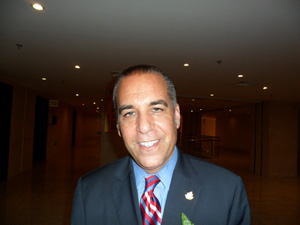[TISC2011]HDL-C与LDL-C水平与复发性卒中的关系,颅内动脉狭窄与心源性脑栓塞抗凝治疗话题——Ralph L. Sacco教授访谈
The data on HDL in terms of recurrent stroke is still not clear. We believe that low LDL levels is a risk factor for cardiovascular disease and stroke and may as well have an effect n recurrence although it is not as strong as compared to heart disease. Te problem is that medications that raise HDL have not proven to be as effective.
 International Circulation: There has been a great deal of debate as to whether raising HDL-C or lowering LDL-C can reduce cardiovascular events. In terms of recurrent stroke what is your opinion on this?
International Circulation: There has been a great deal of debate as to whether raising HDL-C or lowering LDL-C can reduce cardiovascular events. In terms of recurrent stroke what is your opinion on this?
Prof Ralph Sacco: The data on HDL in terms of recurrent stroke is still not clear. We believe that low LDL levels is a risk factor for cardiovascular disease and stroke and may as well have an effect n recurrence although it is not as strong as compared to heart disease. Te problem is that medications that raise HDL have not proven to be as effective. The only positive trial was the gemfibrozil trial but more recently the niacin trial did not show any difference for cardiovascular events and stroke. As a result we are still not sure but there are very promising medications in the pipeline which target HDL.
International Circulation; You mentioned that there is very little data regarding intracranial stenosis. For the future what should studies aiming to elucidate this area encompass?
Prof Ralph Sacco; Intracranial stenosis is very important particularly for china. This is because Chinese patients have a higher incidence of Intracranial stenosis compared to Caucasians. I think we need to know more regarding its risk factors and how w can treat it both in terms of medical and interventional. Recently, the SAMPRAS trial showed that interventional approaches such as stenting were not safe enough. We also need to understand the role genetics plays in predisposing patients o intracranial stenosis. In diabetic patients, in our data showed that diabetic patients are at a particularly high risk for this pathology.
International Circulation: How do you deal with anti-coagulant issues for cardio-embolic stroke patients
Prof Ralph Sacco: Cardio- embolic stroke is a very important stroke subtype and has a high risk of reoccurrence. Atrial fibrillation is a good predictor for the first stroke event and reoccurrence. We do everything we can to get our atrial fibrillation patients who have had a stroke on anti-coagulants. However, we have to monitor these patients very closely whereby the patients INR needs to be at the right target and blood pressure needs to be aggressively controlled and they need to be compliant because you do not want to run the risk of a haemorrhage. We use oral anticoagulants very much so in cardio-embolic stroke but the key s monitoring to reduce the risk of bleeding.



 京公网安备 11010502033353号
京公网安备 11010502033353号